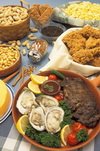|
Zinc – Essential To Growth And DevelopmentZinc is a metallic chemical element with symbol Zn and atomic number 30, it is also a trace mineral that is an essential component of every living cell, with three functions: catalytic, structural, and regulatory. The mineral is known for its role in enzyme structure and function, and its role in controlling the regulation of genes.
Specifically the mineral’s many roles include: fertility and reproduction, hormone activity, sexual maturation, night vision, immune function, hemoglobin activity, lipid metabolism, protein metabolism, gene expression, cell growth and cell replication. Dietary Recommendation The recommended dietary allowance (RDA) for adult males is 11 milligrams/day, for females the RDA is 8 milligrams/day, for pregnant women it is 11 milligrams/day and for lactating women it is 12 milligrams/day. Sources of the Mineral Foods that are good sources of protein have an abundant supply of the mineral, especially red meat and seafood such as clams and oysters. The dark meat of poultry is a good source as well. Fruits and vegetables are poor sources of the mineral.
Mineral Deficiency Deficiency of the mineral is general rare except in those that have illnesses that impair absorption of the mineral. Two such diseases that impair absorption of the mineral are Crohn’s disease and cystic fibrosis. Symptoms of deficiency can include: poor growth, delayed or abnormal sexual development, diarrhea, severe skin rash and hair loss, impaired immune response, and impaired acuity of taste. Mineral Toxicity Toxicity of the mineral is rare since the body eliminates excess mineral efficiently. In the rare cases where toxicity has occurred, symptoms of the deficiency are acute gastrointestinal distress, nausea, vomiting and cramping.
For other information on nutrition some great references are: • Nutrition – Fourth Edition by Paul Insel, Don Ross, Kimberley McMahon, and Melissa Bernstein • The Vitamin Alphabet – Your guide to vitamins, minerals and food supplements by Dr. Christiana Scott-Moncrieff MB, CHB, MFHOM
Nutrients In Food
|







